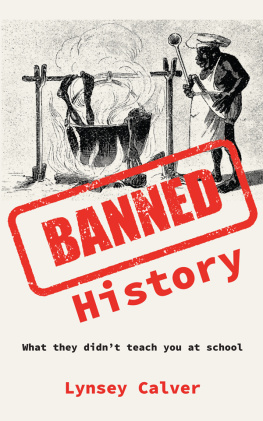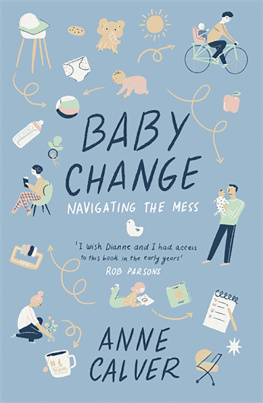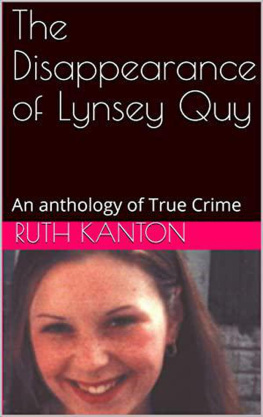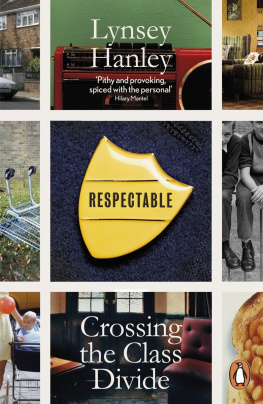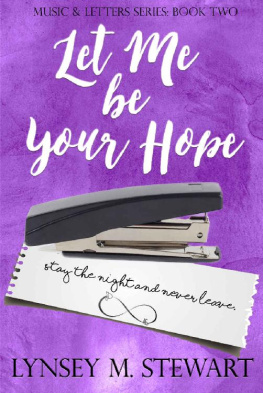Lynsey Calver - Banned History
Here you can read online Lynsey Calver - Banned History full text of the book (entire story) in english for free. Download pdf and epub, get meaning, cover and reviews about this ebook. year: 2022, publisher: Grosvenor House Publishing, genre: Non-fiction. Description of the work, (preface) as well as reviews are available. Best literature library LitArk.com created for fans of good reading and offers a wide selection of genres:
Romance novel
Science fiction
Adventure
Detective
Science
History
Home and family
Prose
Art
Politics
Computer
Non-fiction
Religion
Business
Children
Humor
Choose a favorite category and find really read worthwhile books. Enjoy immersion in the world of imagination, feel the emotions of the characters or learn something new for yourself, make an fascinating discovery.
- Book:Banned History
- Author:
- Publisher:Grosvenor House Publishing
- Genre:
- Year:2022
- Rating:4 / 5
- Favourites:Add to favourites
- Your mark:
- 80
- 1
- 2
- 3
- 4
- 5
Banned History: summary, description and annotation
We offer to read an annotation, description, summary or preface (depends on what the author of the book "Banned History" wrote himself). If you haven't found the necessary information about the book — write in the comments, we will try to find it.
Banned History — read online for free the complete book (whole text) full work
Below is the text of the book, divided by pages. System saving the place of the last page read, allows you to conveniently read the book "Banned History" online for free, without having to search again every time where you left off. Put a bookmark, and you can go to the page where you finished reading at any time.
Font size:
Interval:
Bookmark:


Thank you to my fianc Aaron, for putting up with my prolonged absence from the living room. Thanks for all the food and feedback.
Thank you to my friends Anna and Polly for your never-ending support.
Thank you to my friends Amy, Clelia, and Lou for proofreading my chapters.
Thank you to Phil for allowing me to take a sabbatical from teaching to research and write the book.
Thank you to my family for spurring me on and encouraging my passion for writing as a child.
Thank you to all my students at Dover Grammar School for Boys for your ideas and encouragement. Special shout out to Oliver Q. for your critique on Churchill; Joshua B. for your non-stop encouragement and useful facts about WW2 planes; Georgie H. for pointing me in the direction of the cannibal Albert Fish; and Dan W. for coming up with the title: Banned History.
This would not be possible without you all.
The national curriculum for History in secondary schools does the best it can with 70,000 years of humanity to get through in two-three years. Which, incidentally, is achieved by cheating and only doing a smidge of the ancient era and starting at 1066. Inevitably, this means a glossing over of events and huge number of omissions. The national curriculum is vague at best with the following topics described as should be taught: the development of Church, state and society in Medieval Britain 1066-1509; the development of Church, state and society in Britain 1509-1745; ideas, political power, industry and empire in Britain, 1745-1901; challenges for Britain, Europe and the wider world 1901 to the present day (which includes a mandatory study of the Holocaust); the study of an aspect or theme in British history from before 1066; and at least one study of a significant society or issue in world history.
The curriculum centres firmly on British history with one topic out of six focussing on somewhere else in the world. Because students are able to drop history (sharp intake of breath) when it comes to GCSE options time, many people leave school with a warped view of Britains role in the world. A warping which is facilitated by the school history textbooks completely ignoring things which dont paint the country in a good light. For example, one textbook has four pages dedicated to Britains role abolishing the Atlantic Slave Trade, yet conveniently there is zero mention of Britains role starting it. Banned History has no such rose-tinted view.
Banned History began life after a trip to Auschwitz as part of the Holocaust Educational Trusts (HET) programme. The HET opened my eyes to another side of the Holocaust one that I had not come across in my lessons as a student. The HET taught us about the scale of collaboration from countries conquered by the Nazis, as well as the lack of help for Jews from Britain and her allies; both of which made the Holocaust possible. This other side of the story was also noticeably absent from the textbooks I had been using as a teacher and this got me pondering what else was missing. Soon enough I found myself down a YouTube rabbit hole of conspiracies and clickbait videos such as Facts No One Knows. Whilst further research soon proved a lot of these videos to be utter codswallop, it set me off on a more academic journey to reveal the truth about Britains role in the Holocaust. Churchill has long been a bone of contention for me something which my students love to wind me up about by wearing badges with Churchills face on it or by making bold statements about how he was a diamond geezer. Whilst I concede he deserves credit for the Allies victory in World War Two, I was also aware of other events, such as the Bengal Famine, which suggested he was not the Best Prime Minister Ever (a title he won in a 2010 poll by The Times). This famine occurred during World War Two in the jewel of the British Empire -India - yet is ignored by British school history textbooks because any study into the event would soon reveal how Churchills actions made the situation worse. With there being much debate about Churchill being a racist following his statue being defaced in June 2020, I was eager to uncover the evidence for and against. Thus began my quest to expose the propaganda about Churchill. This soon led me to consider how much other iconic English leaders are misrepresented in history textbooks, and so, Queen Elizabeth I, aka the Virgin Queen, and King Richard I, aka the Lionheart, also came under scrutiny.
Whilst the Holocaust, Churchill, Elizabeth I, and Richard the Lionheart will all appear in your history lessons at school (albeit in an unashamedly biased way) there are some topics which are too depraved and too horrifying for the classroom. But having taught thousands of students over the years, I was aware that these debased topics were the ones which got people interested in history because, lets be honest, learning how best to torture someone is far more engaging than learning about how farming changed in the 18 th century (no offence to all the farmers out there). And so began my enquiry into human depravity which took me on a highly unpleasant (with lots of ewww thats gross moments) yet weirdly enjoyable trip through the history of torture, cannibalism, bestiality, and incest. Lastly, with the recent developments in same sex marriage in the Western world strongly contrasting with the death penalty for homosexuality in other parts of the world, I was curious where homophobia had come from in the first place. The answer was a definite surprise, thats for sure.
In the pages ahead you will discover why Churchill does not deserve to have won Greatest Briton to have ever lived and be able to decide for yourself whether he was a racist. You will be amazed at the extent of homosexuality throughout history and even more surprised to discover how little religion had to do with causing homophobia. You will find out why Elizabeth I is more virgin on being a blagger than she is being an actual virgin, and you will uncover her role starting the Atlantic Slave Trade as well as the real reason she never married. Richard the Lionheart will be shown to be more lying than lion and you will be shocked to discover how badly he treated England - Disney certainly has a lot to answer for in their misleading portrayal of Richard in Robin Hood thats for sure. You will learn valuable life lessons such as how to get away with torture; which family member the British law allows you to marry; and how to avoid being eaten by cannibals. Get ready to be disgusted by Albert Fish who describes exactly how he prepared and cooked his human meals. Can you guess which body part he threw away because it didnt taste as good as the rest? You may want to take some anti-sickness tablets before embarking upon the rollercoaster ride of incest and bestiality and get set to have your opinion on British Queen Elizabeth II changed by this chapter (no spoilers youll have to read on to see whether its incest or bestiality shes a part of).
In addition to all these revelations there are also lots of random facts to enjoy such as who discovered dolphins (and who fell in love with one); why the Vietnam war began; why Russia turned communist; how many bombs were dropped in WW2, how Martin Luther King got his name; how many people Europe killed with their colonisation of the Americas; and when the British government legalised men hitting their wives.
Font size:
Interval:
Bookmark:
Similar books «Banned History»
Look at similar books to Banned History. We have selected literature similar in name and meaning in the hope of providing readers with more options to find new, interesting, not yet read works.
Discussion, reviews of the book Banned History and just readers' own opinions. Leave your comments, write what you think about the work, its meaning or the main characters. Specify what exactly you liked and what you didn't like, and why you think so.

